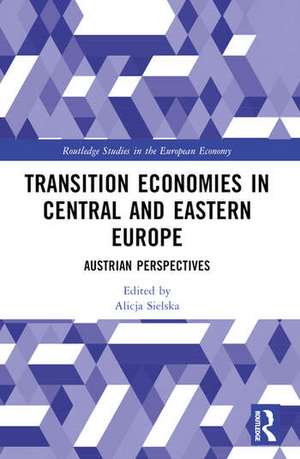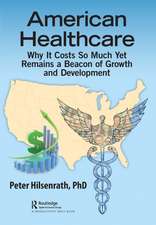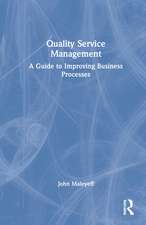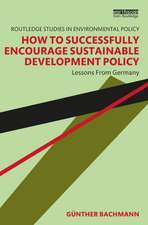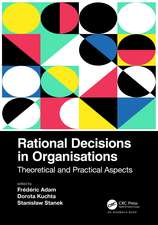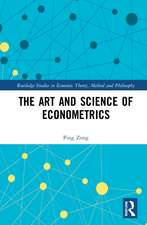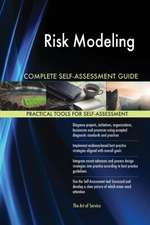Transition Economies in Central and Eastern Europe: Routledge Studies in the European Economy
Editat de Alicja Sielskaen Limba Engleză Paperback – 18 dec 2024
| Toate formatele și edițiile | Preț | Express |
|---|---|---|
| Paperback (1) | 310.55 lei 43-57 zile | |
| Taylor & Francis Ltd. – 18 dec 2024 | 310.55 lei 43-57 zile | |
| Hardback (1) | 1002.95 lei 43-57 zile | |
| Taylor & Francis – 16 aug 2023 | 1002.95 lei 43-57 zile |
Din seria Routledge Studies in the European Economy
-
 Preț: 324.39 lei
Preț: 324.39 lei -
 Preț: 303.89 lei
Preț: 303.89 lei - 20%
 Preț: 148.76 lei
Preț: 148.76 lei - 9%
 Preț: 934.49 lei
Preț: 934.49 lei -
 Preț: 311.41 lei
Preț: 311.41 lei -
 Preț: 316.32 lei
Preț: 316.32 lei - 18%
 Preț: 1057.13 lei
Preț: 1057.13 lei - 18%
 Preț: 1058.65 lei
Preț: 1058.65 lei - 16%
 Preț: 338.33 lei
Preț: 338.33 lei - 25%
 Preț: 524.78 lei
Preț: 524.78 lei -
 Preț: 494.48 lei
Preț: 494.48 lei - 26%
 Preț: 764.62 lei
Preț: 764.62 lei -
 Preț: 466.07 lei
Preț: 466.07 lei - 28%
 Preț: 823.63 lei
Preț: 823.63 lei - 18%
 Preț: 1057.09 lei
Preț: 1057.09 lei - 26%
 Preț: 819.48 lei
Preț: 819.48 lei - 26%
 Preț: 846.50 lei
Preț: 846.50 lei - 18%
 Preț: 1049.99 lei
Preț: 1049.99 lei - 18%
 Preț: 1004.20 lei
Preț: 1004.20 lei - 18%
 Preț: 1332.21 lei
Preț: 1332.21 lei - 31%
 Preț: 765.43 lei
Preț: 765.43 lei - 28%
 Preț: 848.15 lei
Preț: 848.15 lei -
 Preț: 223.01 lei
Preț: 223.01 lei - 18%
 Preț: 703.79 lei
Preț: 703.79 lei - 28%
 Preț: 847.50 lei
Preț: 847.50 lei - 18%
 Preț: 699.96 lei
Preț: 699.96 lei - 28%
 Preț: 828.12 lei
Preț: 828.12 lei - 18%
 Preț: 1159.70 lei
Preț: 1159.70 lei - 18%
 Preț: 1174.70 lei
Preț: 1174.70 lei - 18%
 Preț: 1057.89 lei
Preț: 1057.89 lei -
 Preț: 484.47 lei
Preț: 484.47 lei - 18%
 Preț: 711.10 lei
Preț: 711.10 lei - 28%
 Preț: 848.15 lei
Preț: 848.15 lei -
 Preț: 413.13 lei
Preț: 413.13 lei - 30%
 Preț: 849.65 lei
Preț: 849.65 lei - 28%
 Preț: 875.55 lei
Preț: 875.55 lei - 31%
 Preț: 762.58 lei
Preț: 762.58 lei - 18%
 Preț: 1437.35 lei
Preț: 1437.35 lei - 18%
 Preț: 1108.37 lei
Preț: 1108.37 lei -
 Preț: 495.09 lei
Preț: 495.09 lei - 15%
 Preț: 703.48 lei
Preț: 703.48 lei - 31%
 Preț: 763.81 lei
Preț: 763.81 lei
Preț: 310.55 lei
Nou
Puncte Express: 466
Preț estimativ în valută:
59.44€ • 64.59$ • 49.96£
59.44€ • 64.59$ • 49.96£
Carte tipărită la comandă
Livrare economică 21 aprilie-05 mai
Preluare comenzi: 021 569.72.76
Specificații
ISBN-13: 9781032518107
ISBN-10: 1032518103
Pagini: 200
Dimensiuni: 156 x 234 mm
Greutate: 0.37 kg
Editura: Taylor & Francis Ltd.
Seria Routledge Studies in the European Economy
ISBN-10: 1032518103
Pagini: 200
Dimensiuni: 156 x 234 mm
Greutate: 0.37 kg
Editura: Taylor & Francis Ltd.
Seria Routledge Studies in the European Economy
Cuprins
Introduction (Alicja Sielska) PART I – PRIMER Chapter 1. The Failure of Socialist Central Planning and the Negative Effects from Implementing ESG (Richard Ebeling) Chapter 2. "Carl Menger and the Post-Soviet Transition of Central and European Economies" (Barbara Kolm) PART II – NEW PERSPECTIVES IN THE THEORY OF INTERVENTIONISM Chapter 3. "The Disinterventionist Spiral and the Transition Process in Easten and Central Europe" (Philipp Bagus) Chapter 4. "Free-trade, stable money and market reforms by top-down design Misesian "desperado policy" as daily routine" (Josef Šíma) Chapter 5. "Röpke and his theory of deglobalization. An application to understand current perspectives" (David Sanz-Bas, Miguel Ángel Echarte, Satheesh Varghese, Sergio Náñez) PART III – ECONOMIC TRANSITIONS EXPLAINED Chapter 6. "Entrepreneurship and black markets under socialism. The case of former Eastern bloc" (Gabriel Mursa) Chapter 7. From Power to Market: The Transformation of Centrally Planned Economies and the Theories of Institutional Change (Marek Hudik, Shahab Sharfaei) Chapter 8. The Role of Foreign Capital in Economic Transformation in Poland (Mateusz Benedyk) Chapter 9. "How far are CEE economies from free-market ideals? A look from the point of view of the Austrian School of Economics theory." (Marcin Mrowiec) PART IV – SOCIAL AND ECONOMIC TRANSITIONS: PATTERNS, VALUES AND IDEAS Chapter 10. "Identifying Bottlenecks of Transformation (Mateusz Machaj) Chapter 11. "The Proactive Society: An Introductory Exposition" (Jakub Bożydar Wiśniewski) Chapter 12. "Poverty Relief as a Rule-Based Discovery Procedure: Is a Basic Income Compatible with a Hayekian Welfare State" (Otto Lehto) Chapter 13. Justice in the 21 st Century: Epistemic Argument that Rawls was Wrong (Žiga Turk)
Notă biografică
Alicja Sielska is Assistant Professor in the Institute of Economic Sciences in the Faculty of Law, Administration and Economics at the University of Wroclaw, Poland and Researcher at the University of New York, Prague, Czech Republic.
Recenzii
"Alicja Sielska has assembled an array of chapters that seek to apply a distinctly Austrian school approach to political economy to the economies of Central and Eastern Europe, broadly considered...the attention to the everyday life of comparative economic systems, the dynamics of intervention, the ideological foundations of a free society, and the managerial mechanisms that link financial capital, human capital, and social progress mark this text as a critical companion for all Austrian economists."
Anthony J Evans, ESCP Business School.
Anthony J Evans, ESCP Business School.
